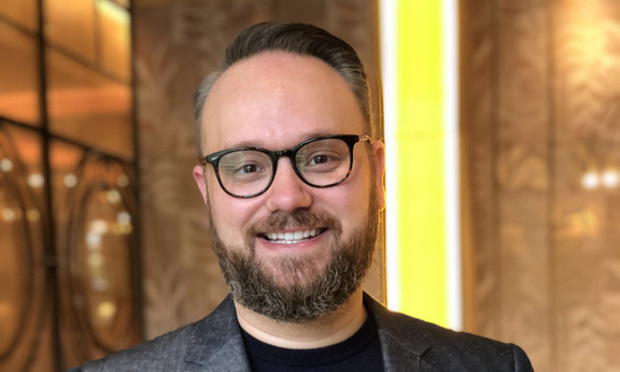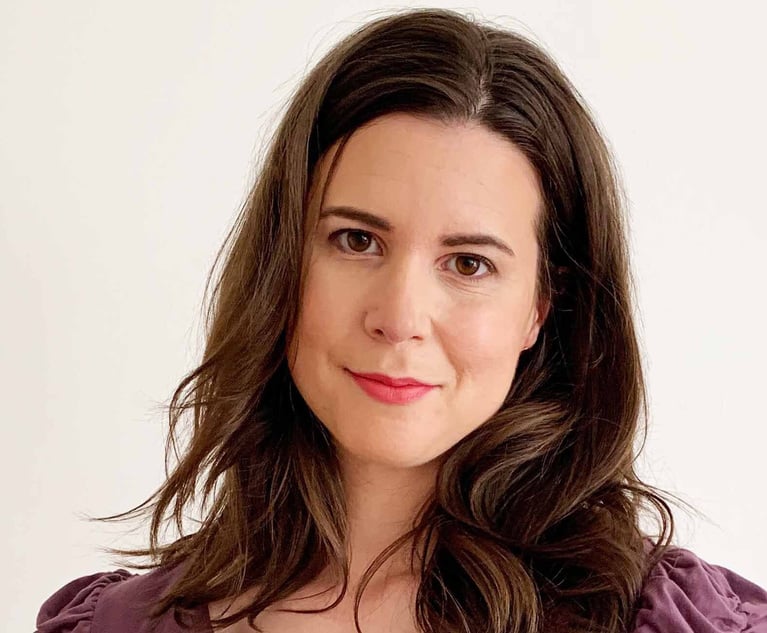1 on 1: Marc Hearron on the Confirmation Clash
On Marc Hearron's first day as Sen. Dianne Feinstein's lead counsel for judicial nominations, President Donald Trump nominated Brett Kavanaugh to the U.S. Supreme Court. Hearron talks about his role on Feinstein's team and what he learned.
January 31, 2019 at 02:27 PM
7 minute read
 Marc Hearron, former MoFo partner, who also worked with Senator Dianne Feinstein's office. January 14, 2019.
Marc Hearron, former MoFo partner, who also worked with Senator Dianne Feinstein's office. January 14, 2019.
On Marc Hearron's first day as Sen. Dianne Feinstein's lead counsel for judicial nominations, President Donald Trump nominated Brett Kavanaugh to the U.S. Supreme Court. Hearron joined the staff of the California Democrat and ranking member of the Senate Judiciary Committee after 11 years at Morrison & Foerster, where he was a partner in the firm's Supreme Court and appellate practice. Hearron's law firm work bore little resemblance to managing a nominations team involved in the most contentious Supreme Court confirmation since the Clarence Thomas-Anita Hill hearings. We spoke with Hearron about his role on Feinstein's team and what he learned. The interview that follows was edited for length and clarity.
How did you come to the Senate position?
I spent 11 years in practice after court clerkships. I really enjoyed the work, and in particular, the pro bono work I was doing. I really just wanted to move into the public arena. So when this opening came up at the Judiciary Committee, it was a great opportunity. The Senate Judiciary Committee has such a long and historic reputation. I wanted to be working on issues that I cared so deeply about.
You accepted the job before Justice Anthony Kennedy announced his retirement?
That's right. My first day was the day of the Kavanaugh nomination. I jumped right into the frying pan. It was truly one of the most intense experiences I've ever been through.
What surprised you the most when you stepped into the job?
Someone told me once I got on the Hill—and it's very true—that when you're litigating, you may be arguing with the other side about something, but ultimately, a judge is going to decide who's right. On the Hill, there is no judge. The judge is the court of public opinion, and so you have to really work to try to get the public to care about issues that are going on.
Your role was heading the judicial nomination team for Sen. Feinstein. Who was on your team?
It was small, and then it very quickly ballooned into a very large team, obviously, because of the Kavanaugh nomination. We hired a lot of special counsel to come in and work on a temporary basis. For Kavanaugh, there were hundreds of thousands of pages of documents to review. We reviewed all of the opinions that he wrote, all of the cases that he sat on as a judge. We hired a lot of talented people. Both sides did. There was an area set up for our people as sort of a war room. We called it "the bunker." It was down in the basement of the Dirksen building.
Even before the Kavanaugh nomination, Senate Judiciary Republicans were moving judicial nominations at a rapid pace. Did that leave time for a personal life?
Well, during the Kavanaugh hearings, I had no personal life, for sure. Once that settled down. I was able to balance things a little bit easier. But the majority was still moving at a record pace.
Was the pace and workload different from your law firm experience?
When you're at the firm, there are times where it's just nonstop work. If I have a brief to write and I need to get a huge section of it done in the next 48 hours, I would typically work from home and just shelter myself. There's not that much flexibility on the Hill. [It's] more of a face-time culture. You have to always be there to respond to your boss if your boss needs you.
Did you speak to Kavanaugh during the confirmation process or to Dr. Ford?
I did not. I had met him previously. We were in the Edward Coke Appellate Inn of Court at the same time, and I had met him there. There were members of the team who did the background investigation and as part of the investigations, they did speak with him and Dr. Ford. I never met Dr. Ford. We didn't know what kind of witness she was going to be. We were not coordinating with her.
What took the bulk of your time during the Kavanaugh hearings?
A large part of my role was trying to handle the documents, dealing with document fights [and] negotiations, processing the documents as they came in [and] heading the document team. There also was a team working on questions. I worked on the questions Sen. Feinstein asked [and] questions for the record posed afterwards. I also worked closely with the counsel for the other Democratic committee members.
There was skepticism about the final FBI investigation into the Kavanaugh allegation. Could the U.S. House examine that investigation?
I certainly think that, at a minimum, there should be a look into how the background investigation process is handled in general. I don't really want to comment on whether the House ought to do its own investigation into the Kavanaugh report. I'll leave that up to them. But I do think that it would be good to have some rules, at least. The way that the background investigation works is: it's really done at the request of the White House, and the White House shares the results of the investigation, or agrees to allow the results of the investigation to be shared with the Congress. I think it would be within Congress's power to pass some legislation about what's required to be in an investigation.
There has been much criticism of the confirmation process. Are there changes to be made?
I would like to see a return to a spirit of working together, the majority and the minority working together. I think a return to that spirit would lead to some better feelings among the members of the committee. As far as the process itself goes, it is what it is. The framers set it up to be a political process, in my view. And with the court deciding the types of issues that they decide, that affect the everyday lives of millions of Americans, it's just going to take on the type of importance that it has in the last several hearings. I don't know of a way to change that, at least not in the near future.
Looking back, what was the best part of the job?
Just being in the middle of the biggest thing going on in the country, waking up every day and going to it, and it's not even just Kavanaugh. I also actually really enjoyed meeting with the press. That's the closest that you get to having a judge, talking to a reporter and trying to explain to them what's going on and then hoping that their story will reflect what is actually happening. So that was fun.
What's next on your plate?
I'm moving back into a litigation role that's still in the public arena. I'm going to the Center for Reproductive Rights. I've worked with them when I was at MoFo on the Whole Woman's Health case and the clinic admitting privileges case which I argued in the Fifth Circuit. I know the work they do and I'm very excited to become a part of it.
This content has been archived. It is available through our partners, LexisNexis® and Bloomberg Law.
To view this content, please continue to their sites.
Not a Lexis Subscriber?
Subscribe Now
Not a Bloomberg Law Subscriber?
Subscribe Now
NOT FOR REPRINT
© 2025 ALM Global, LLC, All Rights Reserved. Request academic re-use from www.copyright.com. All other uses, submit a request to [email protected]. For more information visit Asset & Logo Licensing.
You Might Like
View All

A Conversation with NLJ Lifetime Achievement Award Winner Jeh Johnson

'As I've Grown Older': John Morgan Looks Back at a Life in Law

Binance's Singapore-Based General Counsel Is Shattering Crypto's 'Bro Ceiling'
4 minute readTrending Stories
- 1Carol-Lisa Phillips to Rise to Broward Chief Judge as Jack Tuter Weighs Next Move
- 2Data Breaches in UK Legal Sector Surge, According to ICO Data
- 3Georgia Law Schools Seeing 24% More Applicants This Year
- 4After Shutting USAID, Trump Eyes Department of Education, CFPB
- 5‘Keep Men Out’: Female Swimmers Sue Ivy Leagues Over Lia Thomas’ Sweep
Who Got The Work
J. Brugh Lower of Gibbons has entered an appearance for industrial equipment supplier Devco Corporation in a pending trademark infringement lawsuit. The suit, accusing the defendant of selling knock-off Graco products, was filed Dec. 18 in New Jersey District Court by Rivkin Radler on behalf of Graco Inc. and Graco Minnesota. The case, assigned to U.S. District Judge Zahid N. Quraishi, is 3:24-cv-11294, Graco Inc. et al v. Devco Corporation.
Who Got The Work
Rebecca Maller-Stein and Kent A. Yalowitz of Arnold & Porter Kaye Scholer have entered their appearances for Hanaco Venture Capital and its executives, Lior Prosor and David Frankel, in a pending securities lawsuit. The action, filed on Dec. 24 in New York Southern District Court by Zell, Aron & Co. on behalf of Goldeneye Advisors, accuses the defendants of negligently and fraudulently managing the plaintiff's $1 million investment. The case, assigned to U.S. District Judge Vernon S. Broderick, is 1:24-cv-09918, Goldeneye Advisors, LLC v. Hanaco Venture Capital, Ltd. et al.
Who Got The Work
Attorneys from A&O Shearman has stepped in as defense counsel for Toronto-Dominion Bank and other defendants in a pending securities class action. The suit, filed Dec. 11 in New York Southern District Court by Bleichmar Fonti & Auld, accuses the defendants of concealing the bank's 'pervasive' deficiencies in regards to its compliance with the Bank Secrecy Act and the quality of its anti-money laundering controls. The case, assigned to U.S. District Judge Arun Subramanian, is 1:24-cv-09445, Gonzalez v. The Toronto-Dominion Bank et al.
Who Got The Work
Crown Castle International, a Pennsylvania company providing shared communications infrastructure, has turned to Luke D. Wolf of Gordon Rees Scully Mansukhani to fend off a pending breach-of-contract lawsuit. The court action, filed Nov. 25 in Michigan Eastern District Court by Hooper Hathaway PC on behalf of The Town Residences LLC, accuses Crown Castle of failing to transfer approximately $30,000 in utility payments from T-Mobile in breach of a roof-top lease and assignment agreement. The case, assigned to U.S. District Judge Susan K. Declercq, is 2:24-cv-13131, The Town Residences LLC v. T-Mobile US, Inc. et al.
Who Got The Work
Wilfred P. Coronato and Daniel M. Schwartz of McCarter & English have stepped in as defense counsel to Electrolux Home Products Inc. in a pending product liability lawsuit. The court action, filed Nov. 26 in New York Eastern District Court by Poulos Lopiccolo PC and Nagel Rice LLP on behalf of David Stern, alleges that the defendant's refrigerators’ drawers and shelving repeatedly break and fall apart within months after purchase. The case, assigned to U.S. District Judge Joan M. Azrack, is 2:24-cv-08204, Stern v. Electrolux Home Products, Inc.
Featured Firms
Law Offices of Gary Martin Hays & Associates, P.C.
(470) 294-1674
Law Offices of Mark E. Salomone
(857) 444-6468
Smith & Hassler
(713) 739-1250








